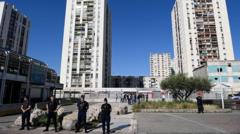Officials in Nîmes, located in the south, recently instituted these measures as part of a broader effort to mitigate the risks of violence for those under 16. Nîmes Mayor Jean-Paul Fournier described the deteriorating conditions as "untenable," citing a series of shootings and the distressing discovery of a young man's body, which were directly tied to the ongoing drug trade. The new curfews, which run from 9 PM to 6 AM, will have additional police presence in the area to enforce compliance and maintain order.
The curfew is intended to not only safeguard minors who are not engaged in drug activities but also to protect younger children, some as young as 12, who are often targeted for exploitation by drug dealers, according to Deputy Mayor Richard Schieven.
Béziers, situated about 120 kilometers southwest of Nîmes, has a pre-existing curfew for children under 13 that was first introduced last year and recently extended to those under 15 in specific neighborhoods. Mayor Robert Ménard highlighted the folly of allowing young children to roam the streets late at night, referencing the mischief and trouble they can encounter, particularly at 2 AM.
Despite these precautions in Béziers, the city remains a hotspot for violence as reported incidents of attacks on police by masked youths using fireworks have surfaced recently. Limoges, another city grappling with similar issues, has also imposed curfews for minors during the summer holidays. Nonetheless, Mayor Émile Roger Lombertie of Limoges expressed frustration over the ineffectiveness of the curfew during violent outbreaks involving large groups of youth, calling for enhanced policing efforts.
Two years back, Nîmes faced public outrage when a 10-year-old boy was tragically killed during a drug-related incident, underscoring the ongoing threat of drug violence that has been spreading beyond the notorious gang conflicts in Marseille. In 2024 alone, reported cases of drug violence resulted in 110 fatalities and over 300 injuries across France, as stated by the Interior Ministry.
To tackle the escalating crisis, Interior Minister Gérard Darmanin and Justice Minister Bruno Retailleau have introduced new legislation aimed at combating drug trafficking. This includes setting up maximum-security prisons dedicated to housing notorious drug criminals, establishing a specialized prosecution unit, and granting additional powers to law enforcement. Recently, Darmanin confirmed the transfer of 17 of the country's most dangerous traffickers to a high-security prison in Vendin-le-Vieil.
The rising incidents of violence, including arson and gunfire aimed at French prisons attributed to drug gangs, further accentuate the urgent need for sustained governmental action against drug-related crime.
The curfew is intended to not only safeguard minors who are not engaged in drug activities but also to protect younger children, some as young as 12, who are often targeted for exploitation by drug dealers, according to Deputy Mayor Richard Schieven.
Béziers, situated about 120 kilometers southwest of Nîmes, has a pre-existing curfew for children under 13 that was first introduced last year and recently extended to those under 15 in specific neighborhoods. Mayor Robert Ménard highlighted the folly of allowing young children to roam the streets late at night, referencing the mischief and trouble they can encounter, particularly at 2 AM.
Despite these precautions in Béziers, the city remains a hotspot for violence as reported incidents of attacks on police by masked youths using fireworks have surfaced recently. Limoges, another city grappling with similar issues, has also imposed curfews for minors during the summer holidays. Nonetheless, Mayor Émile Roger Lombertie of Limoges expressed frustration over the ineffectiveness of the curfew during violent outbreaks involving large groups of youth, calling for enhanced policing efforts.
Two years back, Nîmes faced public outrage when a 10-year-old boy was tragically killed during a drug-related incident, underscoring the ongoing threat of drug violence that has been spreading beyond the notorious gang conflicts in Marseille. In 2024 alone, reported cases of drug violence resulted in 110 fatalities and over 300 injuries across France, as stated by the Interior Ministry.
To tackle the escalating crisis, Interior Minister Gérard Darmanin and Justice Minister Bruno Retailleau have introduced new legislation aimed at combating drug trafficking. This includes setting up maximum-security prisons dedicated to housing notorious drug criminals, establishing a specialized prosecution unit, and granting additional powers to law enforcement. Recently, Darmanin confirmed the transfer of 17 of the country's most dangerous traffickers to a high-security prison in Vendin-le-Vieil.
The rising incidents of violence, including arson and gunfire aimed at French prisons attributed to drug gangs, further accentuate the urgent need for sustained governmental action against drug-related crime.




















